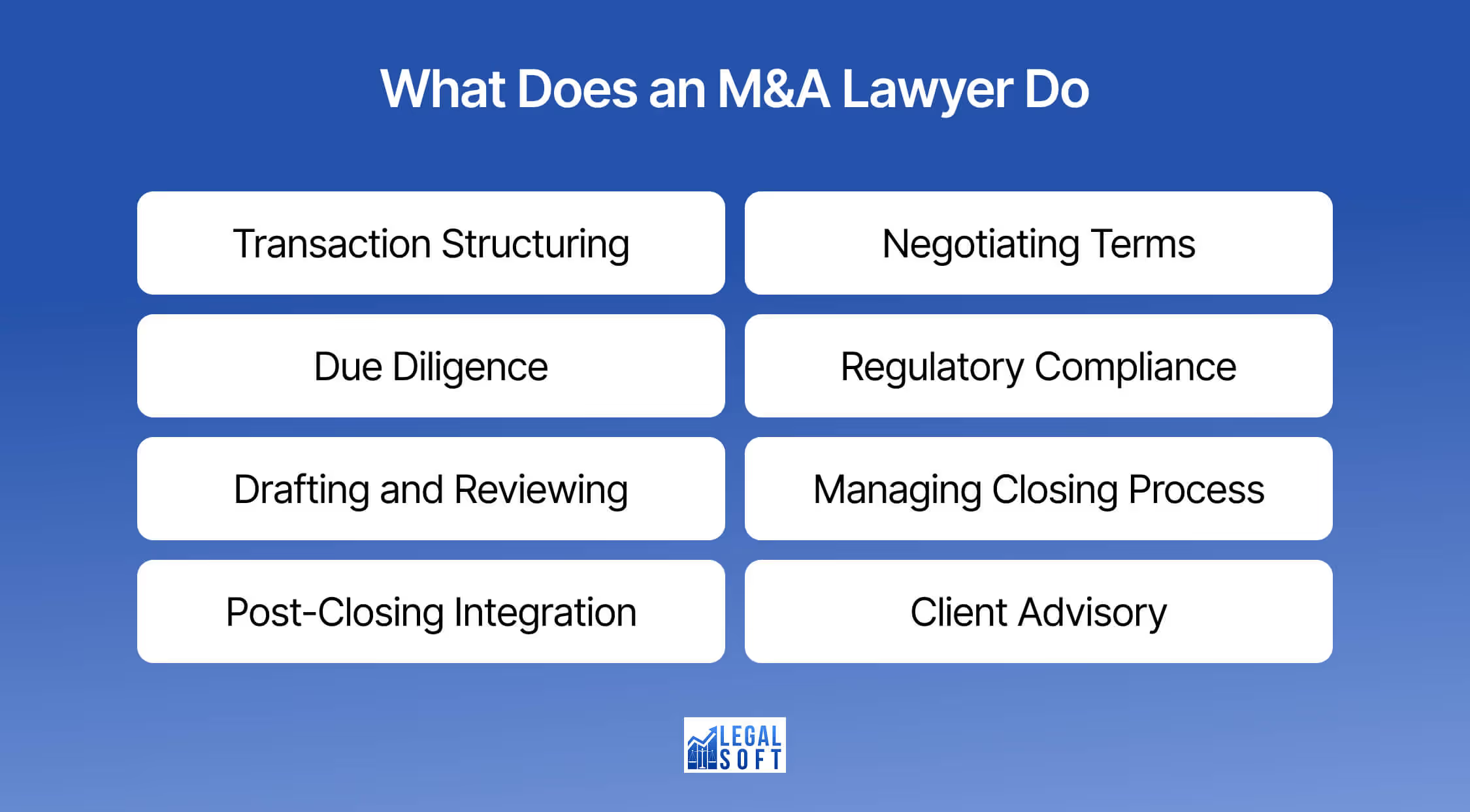When companies plan to divide, sell, restructure, or combine with another company, the term “mergers and acquisitions” often comes up. Simply put, a merger happens when two separate entities combine to form one, while an acquisition occurs when one company buys most or all of another company’s shares to take control.
These intricate business dealings fall under mergers and acquisitions law, a branch of corporate law that governs how two or more companies are purchasing and/or consolidating through mergers, acquisitions, asset purchases, and other corporate transactions.
The M&A legal framework covers every stage of buying or combining companies. It spans multiple areas of law, including corporate law, securities regulation, tax law, antitrust rules, and contract law. An M&A lawyers' understanding and expertise across these legal areas is essential for navigating each transaction and ensuring success in the high-stakes world of corporate dealmaking.
The Role of a Mergers and Acquisitions Lawyer
An M&A lawyer is a legal professional who specializes in advising and facilitating the legal aspects of buying, selling, or merging business entities. These lawyers are experts in negotiating, drafting, and analyzing the contracts and documents involved in these transactions while ensuring compliance with applicable laws and regulations.
Think of them as the legal architects of business transactions, overseeing every phase from initial negotiations through post-closing integration. M&A lawyers protect clients' interests and serve as advisors, helping them identify potential risks, maximize value, and successfully close deals that align with their goals.
The typical transactions an M&A lawyer handles include:
- Mergers – Legal consolidation of two companies into a single entity
- Acquisitions – One company purchasing another, either through stock or assets
- Stock purchases – Acquisition of a company through buying its shares
- Asset purchases – Selective acquisition of specific business assets and liabilities
- Joint ventures – Formation of new business entities owned by multiple parties
- Divestitures – Sale or spin-off of business divisions or subsidiaries
- Leveraged buyouts – Acquisitions financed primarily through debt
- Recapitalizations – Restructuring of a company's debt and equity mix
- Private equity transactions – Investment deals involving private capital firms
- Takeovers – Attempts to gain control of a company, often via public bids
Scope of Work and Responsibilities of an M&A Lawyer
The M&A process is more than just buying companies, it includes multiple types of transactions, each with its own unique set of responsibilities. This makes the duties of an M&A lawyer essential at every phase of the deal. Their work begins long before any agreement is signed and often extends well after the closing date.
An M&A lawyer's work centers on ensuring that each transaction is legally sound, advantageous for clients, and compliant with all regulatory requirements. Whether the deal involves a family-run business or one of the largest deals in the market, M&A lawyers provide a clear legal road map to navigate every phase.

1. Transaction Structuring
Every M&A deal begins with a strong foundation—the structure. M&A lawyers help clients determine how a deal should be executed, whether it's a stock purchase, asset purchase, merger, or the creation of a new legal entity.
Key factors they assess include:
- Tax law implications
- Regulatory considerations
- Financial performance goals
- Long-term management plans
- Legal entity restructuring
They also evaluate whether the transaction involves a domestic company or is cross-border, as this distinction can significantly impact the deal structure and legal obligations. This foundational decision shapes every aspect of the transaction that follows
2. Negotiating Terms
Once the structure is clear, M&A lawyers step in to negotiate terms with the other party’s counsel. This is where their ability to provide advice, assess risks involved, and foresee long-term outcomes comes into play.
They negotiate:
- Purchase agreement terms
- Payment structure (cash, stock, earn-outs)
- Representations and warranties
- Indemnification clauses
- Closing conditions
- Employment or management arrangements
These negotiations are tailored to the priorities of both the buyer and the seller. M&A lawyers work to ensure that their client enters the deal with confidence in a final agreement that reflects their strategic and financial objectives.
3. Due Diligence
Due diligence is one of the most sensitive and time-consuming stages of any M&A transaction. During this phase, lawyers conduct a full legal audit of the target company to uncover potential liabilities, red flags, and opportunities.
They review:
- Corporate documents
- Intellectual property rights
- Existing contracts and vendor agreements
- Employment agreements
- Litigation history
- Regulatory compliance
Working alongside financial and tax advisors, M&A lawyers also evaluate how the target company’s financial performance aligns with the buyer’s objectives. This step helps determine whether to adjust the deal value or renegotiate terms if any issues are discovered.
4. Regulatory Compliance
M&A lawyers handle all aspects of regulatory compliance, which is essential in both domestic and cross-border deals. Regulatory approval may be required from:
- Antitrust and competition authorities
- Securities regulators (especially with public companies)
- Industry-specific agencies (e.g., banking, telecom)
They also review privacy laws, export controls, and employment regulations that could affect the transaction. Regulatory requirements vary based on the location and industry of the target company, so M&A lawyers must stay current on changing legislation across jurisdictions.
In many cases, failure to secure timely approval can delay or even derail the deal. As a result, lawyers must proactively manage timelines, filings, and documentation to keep the process on track.
5. Drafting and Reviewing Legal Documents
Legal documents form the backbone of any M&A deal. M&A lawyers are responsible for drafting, reviewing, and finalizing a wide range of documents, including:
- Purchase agreements
- Confidentiality agreements (NDAs)
- Shareholder or member agreements
- Non-compete and non-solicitation clauses
- Board resolutions
- Disclosure schedules
They ensure that every clause aligns with the negotiated terms and that sensitive information is protected. Even minor oversights in documentation can result in major financial or legal exposure, so accuracy and clarity are non-negotiable.
6. Managing Closing Process
Once approvals are in place and the paperwork is finalized, M&A lawyers oversee the closing process by handling filings, fund transfers, and final approvals. This phase requires coordination among:
- Internal legal teams
- Outside counsel
- Financial institutions
- Regulatory bodies
- Business leaders and management
M&A lawyers manage the logistics, resolve last-minute disputes, and ensure that all parties have met the conditions of closing. For deals involving large companies or cross-border transactions, this process can involve legal activity spanning several weeks.
7. Post-Closing Integration
M&A lawyers don't always walk away after closing. Integration challenges often arise, and their role frequently extends into post-closing legal activities, helping clients with:
- Business entity restructuring
- Intellectual property transfers
- Updating regulatory filings
- Employment transitions
- Dispute resolution
- Ongoing contract compliance
Their job is to help ensure that the integration process does not create legal bottlenecks that disrupt operations or financial performance. Especially for large companies or serial acquirers, this phase is critical to a seamless transition and the long-term success of the transaction.
8. Client Advisory
Throughout the entire process, M&A lawyers serve as trusted advisors, explaining complex legal concepts and providing strategic counsel that differs from deal to deal. They keep clients informed about legal developments that could impact the transaction and help them make decisions that align with both their business goals and legal obligations.
Skills and Qualities of an M&A Lawyer
We’ve explored the role and duties of an M&A lawyer, but what makes them effective? As M&A lawyers juggle complex responsibilities for clients seeking to grow, restructure, or exit the market, they must possess the right skills and qualities to address the legal challenges that can arise in any deal.
- Business Acumen: M&A lawyers operate across diverse industries. They must understand business operations, financial metrics, and industry dynamics so they can think like business people and provide effective counsel.
- Negotiation Expertise: They balance assertiveness with diplomacy, knowing when to push or compromise to advocate effectively for their clients while maintaining productive relationships with opposing counsel.
- Communication Skills: M&A lawyers must explain complex legal concepts in plain terms, translate jargon for clients without legal backgrounds, and keep all stakeholders informed throughout the transaction.
- Analytical Thinking: They analyze massive amounts of information and financial structures to identify hidden liabilities and spot potential legal issues that others might miss.
Average M&A Lawyer Salary

The average salary for an M&A lawyer in the United States is $175,207 per year. Salaries can vary based on factors such as experience, location, firm size, and industry specialization. Lawyers working in industries such as technology, healthcare, or private equity often command higher base salaries due to the complexity of regulatory requirements and the high value of transactions.
For a general guide, here’s a breakdown of the average salary in the top 15 highest-paying U.S. states:
These figures are approximate, as specific data on M&A lawyers by state is limited, and salaries can vary significantly depending on the type of employer.
Work Environments for M&A Lawyers
M&A lawyers practice in diverse settings, each offering a distinct experience and focus:
- Law Firms: The majority of M&A lawyers work at law firms, particularly large corporate firms that handle complex, high-value transactions.
- In-House Corporate Counsel: In this setting, lawyers work directly within a corporation’s legal department, managing transactions from the company’s perspective rather than as outside advisors.
- Remote: Advances in technology have expanded opportunities for M&A lawyers to work remotely, with 87% of law firms allowing it according to the American Bar Association's work survey. This virtual environment enables lawyers to serve clients globally and offers flexibility to combine remote and in-person meetings for various tasks.

Market Insights and Outlook
M&A deal volumes in the U.S. exceeding $100 million are predicted to grow by 9% in 2025 and 3% in 2026, according to the EY-Parthenon M&A Outlook. This growth highlights the increasing activity handled by M&A lawyers, which continues to expand year after year.
M&A is a fundamental part of corporate culture and isn't going away even when economic fluctuations occur. It is the lifeblood of the private equity world, with companies constantly pursuing deals. This ongoing demand underscores that expertise in M&A law continues to offer strong career opportunities for talented professionals.
Tips for Selecting the Right M&A Lawyer
Finding the right M&A lawyer can greatly increase your chances of a successful deal outcome. Getting the ideal match involves research, evaluation, and assessment of candidates based on your situation and goals. Here are some tips to consider:
- Assess Your Specific Needs: Determine the type of transaction and areas where you will need assistance. This clarification of your needs will help you find a lawyer with specific experience and industry specialization in those areas. A lawyer who has successfully handled similar deals can better understand regulatory requirements and anticipate potential issues.
- Consider Communication Style: Effective communication is critical. Choose a lawyer who explains legal concepts clearly, listens carefully to your concerns, responds promptly, and keeps you informed throughout the process.
- Evaluate Affordability: While cost shouldn't be your only consideration, you need transparent pricing and reasonable rates. During the initial consultation, discuss fee arrangements upfront, including whether the lawyer charges hourly rates, flat fees, or alternative billing structures. Focus on finding a lawyer whose quality of service justifies the investment required.
- Consider Resources: High-stakes transactions often require significant resources and collaboration among multiple professionals. Ask whether the lawyer has adequate staffing and expertise to handle all aspects of your matter, including areas such as intellectual property, tax, and employment law, so your transaction is fully supported.
Final Thoughts
An M&A lawyer is a versatile and invaluable partner, offering expertise and guidance throughout mergers and acquisitions. As the business landscape continues to evolve, their ability to protect clients’ interests, structure deals, and navigate regulatory requirements provides efficiency and peace of mind for companies.
Whether you're buying your first business, selling a company you've built over decades, or merging with another entity, the expertise of an M&A lawyer helps create smoother transactions and more favorable outcomes.
Get Started with an M&A Lawyer
At Legal Soft, we connect law firms with M&A lawyers and legal professionals who bring the expertise needed to support complex transactions and demanding workloads. Our network consists of qualified candidates trained to work remotely, helping you achieve your business objectives while maintaining the highest standards of service.








